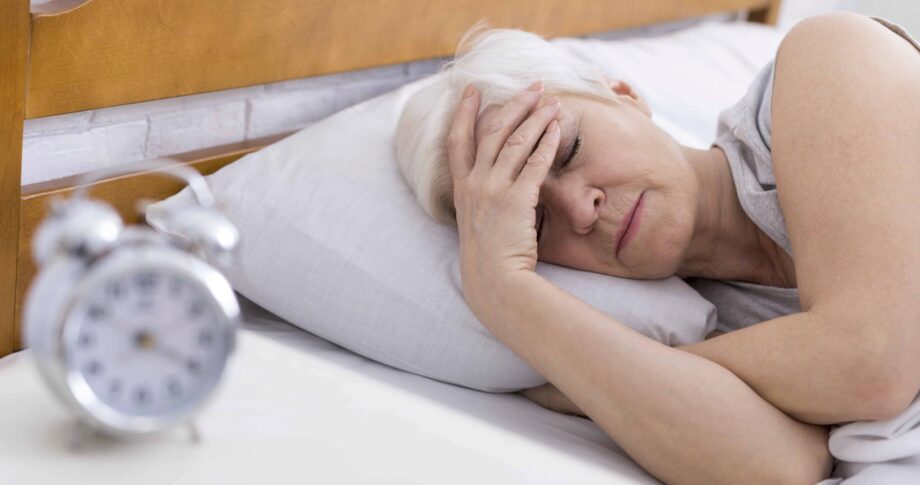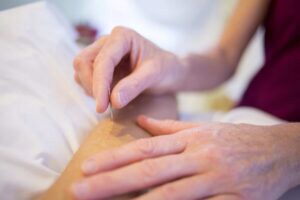Sleep and PTSD
Disclosure: By clicking on the product links in this article, Mattress Nerd may receive a commission fee at no cost to you, the reader. Read full disclosure statement.
Posttraumatic stress disorder, or PTSD, is a psychiatric disorder that affects approximately 3.5% of U.S. adults. It can occur when someone experiences or witnesses a traumatic event and is left continually reliving the fear and trauma of the experience. People with PTSD often have difficulty falling asleep or staying asleep at night and, as a result, may suffer from sleep problems, such as insomnia or delayed sleep phase disorder. But for people with PTSD, there is hope. Effective treatments and therapies have helped millions of people find relief from their PTSD symptoms and get better sleep.

What is PTSD?
PTSD is an emotionally painful and sometimes debilitating condition. It can occur when someone experiences or witnesses a traumatic event — one that deeply distresses or disturbs them — such as a natural disaster, serious accidents, terrorist acts, war, sexual assault, or other violent personal assault. PTSD often affects veterans, people who have lived through hurricanes or terrorist acts, and victims of child abuse, domestic violence, violent injury, and car crashes. PTSD can affect anyone from any ethnicity, nationality, culture, or age, but affects women twice as often as men. It is believed that as many as 1 in 11 people will be diagnosed with the condition at some point in their lives.
People who suffer from PTSD have severe anxiety and intense, disturbing thoughts and emotions associated with the traumatic experience that last long after the event has ended. The memories and feelings come back as flashbacks or nightmares. They can lead to feelings of detachment from others. People may even begin to avoid situations or people who remind them of the painful or difficult experience.
While most people may temporarily experience a hardship after a traumatic event, in time, with good self-care, they generally overcome it. But for some, the symptoms can worsen and linger for years, interfering with day-to-day activities. This is when PTSD is generally diagnosed by a medical professional like a psychologist or psychiatrist.
Diagnosing PTSD
PTSD is a relatively new diagnosis, but it has been around for years and known by different names. Men who lived through World War I were sometimes diagnosed with “shell shock” or were told they were just “nervous from the service.” Those who experienced combat during World War II were sometimes diagnosed with “combat fatigue.” It wasn’t until the 1980s that the term posttraumatic stress disorder and the acronym PTSD were officially classified in the Diagnostic and Statistical Manual of Mental Disorders (DSM-III) published by the American Psychiatric Association. Since then, diagnostic criteria and treatments for PTSD have evolved in an effort to better identify and treat people with this condition.
If you think you have PTSD, it’s a good idea to talk with your medical doctor to rule out any medical conditions. You will also want to see a doctor experienced in mental illnesses, such as a psychiatrist or psychologist. They can diagnose you as well as prescribe a treatment plan. In general, the condition is diagnosed in adults who experience symptoms of PTSD for at least a month.

Symptoms of PTSD
Symptoms of PTSD may start a month after the traumatic event up to several years. Everyone experiences symptoms differently. In general, there are four types of PTSD symptoms:
- Reliving the event.
- These symptoms are identified by unwanted, intrusive thoughts of the event, having flashbacks or nightmares about the event, or experiencing severe emotional distress or physical reactions to things that trigger memories of the event. For example, a war veteran may duck for cover when he hears a truck backfire.
- Avoiding reminders of the trauma.
-
- People who have experienced a trauma may avoid thinking or talking about the event, or even avoid places and people that remind them of the event.
- Negative thoughts and emotions.
- PTSD may trigger negative thoughts about yourself, hopelessness about the future, make you feel detached from loved ones, and leave you feeling emotionally numb. In some cases, you may forget some important aspects of the traumatic event you experienced.
- Hyperarousal and being on-guard.
- People with PTSD may frequently be in a state of heightened alert like they are in real danger. This can cause the person to engage in destructive behavior such as drinking too much or driving erratically, having difficulty concentrating, having trouble sleeping, or feeling overwhelming guilt or shame.
How PTSD Affects Sleep
Sleep is when our brains process memories, emotional ones in particular. Thus, sleep is vital for helping victims of trauma process the event that has occurred. Unfortunately, between 70% and 91% of adults with PTSD have difficulty falling asleep and staying asleep, which interferes with their processing memories. And up to 71% report having nightmares, which can jolt them awake at night.
PTSD has been shown to interfere with the sleep process by increasing light sleep; decreasing restorative deep sleep; and interfering with REM (rapid eye movement), the sleep stage in which dreaming and nightmares occur.
Nightmares
Most everyone experiences nightmares from time to time. But people who have PTSD are more likely to suffer from them, often reliving the traumatic event up to several times a week for months or years after the experience. PTSD nightmares can be more intense and may not always be a replay of the trauma. “The individual may dread going to sleep because they don’t want to experience trauma-related nightmares and will do anything they can (sometimes including substances) to avoid sleep. Since bedtime is often one of the only times we are isolated with our thoughts without distractions, worry thoughts and trauma memories can keep a person awake at night for hours,” says Dr. Nikki Winchester, Owner of Cincinnati Center for DBT.
Nightmares may also trigger waking in order to escape the fear that accompanies a nightmare. Thus, PTSD is closely intertwined with sleep disorders including insomnia, delayed sleep phase disorder, obstructive sleep apnea, as well as sleepwalking, sleep talking, and night terrors. These disorders can result in poor quality sleep.
Research suggests that nightmares after trauma may also occur earlier in the night and during stages of sleep other than REM sleep. Victims of trauma can also have panic attacks and sleep terrors during non-REM sleep.
Insomnia
Insomnia is a common sleep disorder in which you have difficulty falling asleep or staying asleep. Or you may wake up too early and not be able to fall back to sleep. About 70% of people with PTSD have insomnia. Some reasons may be because they develop fears about going to sleep. Sleep is a time when we are more vulnerable and unable to defend ourselves. It’s also a time when dreams can turn into nightmares. Some trauma victims may also worry they may experience a sleep terror, or act out their nightmares while asleep. This is frightening to the person having a sleep terror but can be dangerous to their bed partner.
Delayed Sleep Phase Disorder
Delayed sleep phase disorder, officially known as delayed sleep-wake phase sleep disorder, is a circadian rhythm sleep disorder. It occurs when a person’s sleep is delayed by two or more hours beyond what is considered a “normal” bedtime, causing you to go to sleep and wake later. People with PTSD are at an increased risk of developing delayed sleep phase disorder if they avoid going to bed at night because their anxiety levels increase at bedtime, or because they fear having nightmares about their trauma.
Obstructive Sleep Apnea
Obstructive sleep apnea (OSA) is a sleep-related breathing disorder in which the tissues in the mouth fall into the back of the throat while sleeping and block the airway. This causes you to stop breathing for a period of time before jolting awake and gasping. OSA can interfere with sleep, but it can also lead to low blood oxygen levels, which can be life-threatening.
Sleep apnea more often occurs in people with PTSD compared to the general population. Some studies suggest that people with sleep apnea are more prone to developing PTSD. Why this happens is somewhat of a mystery. But, one of the biggest risk factors for the sleep disorder is weight gain. It is possible that the physical and psychological stress PTSD puts on individuals may lead them to adopt unhealthy lifestyles that include eating poorly, drinking alcohol excessively, and not getting enough exercise.
Sleep apnea can disrupt sleep throughout the night leading to excessive daytime sleepiness. It is also linked to high blood pressure, heart disease, diabetes, and mental health conditions like anxiety and depression.
Substance abuse
According to a study published in the European Journal of Psychotraumatology, people diagnosed with PTSD are three times more likely to abuse substances like drugs or alcohol. They are also more likely to self-medicate with alcohol or drugs like cocaine and thus, are 14 times more likely to be diagnosed with a substance use disorder (SUD).
Both drugs and alcohol can interfere with sleep. For example, alcohol is considered a sedative. And while it may induce sleep, it can adversely affect the quality of sleep. Alcohol can wake you several times during the second half of the sleep period. It also prevents deep sleep and REM sleep, both of which you need to feel refreshed and restored in the morning.
Drugs cause chemical changes in the body that have a direct impact on your circadian rhythm, which is your body’s 24-hour internal clock that regulates your sleep and wake cycles. As a result, your sleep is disrupted. Drugs can also lead to sleep disorders such as insomnia and obstructive sleep apnea.

Mental health conditions
People with PTSD often experience anxiety and depression, two conditions linked to sleep problems:
- Anxiety: Anxiety is the body’s natural response to stress. You may feel anxious before giving a presentation or going to a job interview, which is perfectly normal. But, anxiety can become a chronic problem when the worry and fear doesn’t go away, gets worse, and begins to interfere with daily activities. “High levels of anxiety in general can cause increased muscle tension, increased heart rate, and difficulty calming the body and mind which makes it hard to fall and stay asleep. Because PTSD is an anxiety disorder, sleep-related issues will occur by virtue of it being an anxiety disorder,” says Dr. Julia Kogan, who specializes in stress and anxiety.
- Depression: Depression is more than just “the blues.” It is a serious mood disorder that affects how you feel, think, and handle day-to-day activities. Symptoms include persistent sadness, hopelessness, and loss of interest or pleasure in hobbies or activities.
Sleep and mood are intertwined. Poor sleep doesn’t cause anxiety or depression, but it can worsen mood disorders. People who suffer from anxiety or depression often have insomnia. Depressed individuals are also five times more likely to suffer from a sleep-disordered breathing condition, like obstructive sleep apnea, according to a study published in the Journal of Clinical Psychiatry. Sleep apnea occurs when the windpipe becomes blocked, causing you to waken repeatedly to gasp for air.
Physical health conditions
Trauma can cause psychological issues, but it can also impair our physical health.
- Chronic pain: Studies have found a close connection between chronic pain and PTSD. Approximately 15% to 35% of people with chronic pain also have PTSD, and 51% of people with chronic low back pain also have PTSD.
- Heart disease: There is also a close correlation between psychological stress and cardiovascular disease. In fact, several studies have found that people with PTSD are more likely to develop and die from heart disease compared to people without PTSD. Furthermore, the severity of PTSD symptoms is linked to a greater risk of dying from heart disease, according to the National Center for PTSD.
Recent studies have found that pain and sleep are reciprocal. Pain can interfere with a good night’s sleep, which can lead to a sleep deficit. And poor sleep can cause pain or exasperate existing pain. Inadequate sleep can also reduce the body’s tolerance to pain and worsen inflammation.
There is also a reciprocal relationship between cardiovascular disease and sleep. For example, people with heart failure often wake frequently during the night because their lungs fill with fluid, making it difficult for them to breathe. There is also evidence that heart failure can lead to central sleep apnea, a breathing problem in which the brain doesn’t send proper signals to the muscles that control your breathing. This causes you to stop breathing and thus wake repeatedly throughout the night. Sometimes nocturnal chest pain or heart palpitations can wake you during the night as well. It is also well documented that poor sleep is associated with high blood pressure, heart disease, diabetes, and obesity.
Sleep Tips and Treatment
Seeking help from a medical professional is the first step to treating symptoms of PTSD. Several therapies have proven effective. Your doctor may recommend one or more treatment options:
Cognitive Behavioral Therapy
Cognitive-behavioral therapy (CBT) is a form of psychotherapy that helps people change their thought patterns. CBT has been demonstrated to be effective for a range of problems including anxiety, depression, alcohol and drug problems, and PTSD. In fact, CBT is considered the most effective treatment for PTSD in both the short-term and long-term. Cognitive-behavioral therapy involves processing the traumatic event and the thoughts, feelings, and behaviors associated with it, which can help reduce insomnia and improve the overall quality of sleep. There are different types of CBT. Some involve visualizing, talking, or thinking about the traumatic memory. Other types involve focusing on changing beliefs about the trauma. Some types of CBT include:
- Prolonged Exposure (PE): This therapy involves gradually facing your fear by talking about your trauma with your therapist. You will also be encouraged to go places and do things you have avoided because they remind you of the event. In time, you gain control of your anxiety and your PTSD symptoms decrease.
- Cognitive Processing Therapy (CPT): This therapy involves talking about your trauma as well as writing about it. It teaches you a new way to handle upsetting thoughts. Gradually, you will learn how to reframe your thoughts and beliefs about your trauma.
- Eye Movement Desensitization and Reprocessing (EMDR): EMDR uses back and forth eye movements or sound while you recall memories of a traumatic event to help you process and make sense of the event. EDMR is an effective PTSD treatment. However, it is not fully understood just how it works.
- Stress Inoculation Training (SIT): This type of therapy teaches you skills to react differently to stressful scenarios and how different situations, thoughts, and behaviors could be impeding your coping mechanisms. With practice, you become more confident in your ability to manage your PTSD symptoms.
Medication
Your medical professional may prescribe medication, such as SSRIs (selective serotonin reuptake inhibitors) or SNRIs (serotonin-norepinephrine reuptake inhibitors) to help you deal with your PTSD symptoms. These antidepressants are also used to treat anxiety and depression. Four that are specifically recommended for PTSD include:
- Sertraline (brand name Zoloft)
- Paroxetine (brand name Paxil)
- Fluoxetine (brand name Prozac)
- Venlafaxine (brand name Effexor)
There are other medications that are used to treat PTSD, but the evidence to support their effectiveness is not as strong as it is with SSRIs or SNRIs. These medications include:
- Nefazondone (brand name Serzone), a serotonin reuptake inhibitor (SRI)
- Imipramine (brand name Tofranil), a tricyclic antidepressant (TCA)
- Phenelzine (brand name Nardil), a monoamine oxidase inhibitor (MAOI)
Additional therapies
In addition to those listed above, there is a variety of complementary and biological therapies used to treat PTSD, as well.
Complementary and integrative medicine approaches include:
- Yoga — A mind and body practice that combines physical postures, breathing techniques, and relaxation that can reduce anger and calm the central nervous system.
- Meditation — The practice of focusing the mind on an object, thought, or activity, to achieve mental clarity and emotional calm.
- Acupuncture — An alternative therapy that involves inserting thin needles into targeted pressure points on the body. This can provide relief from anxiety, depression, and chronic pain.
- Relaxation therapy — A type of therapy that reduces muscle tension and stress. It involves tensing and relaxing the muscles throughout the body. It is sometimes used with focused imagery or meditation.

While biological treatments might involve:
- Hyperbaric oxygen therapy — This treatment involves breathing oxygen in a pressurized chamber. Doing so increases the amount of oxygen in your blood, which restores normal levels of blood gasses and tissue function.
- Transcranial magnetic stimulation — This noninvasive procedure uses magnetic fields to stimulate nerve cells in the brain to improve symptoms of depression. It is generally used only after other depression treatments have been shown ineffective.
Sleep hygiene improvements
Improving your sleep hygiene can also help you sleep better. Here are some suggestions on how to improve your sleep hygiene:
- Establish a relaxing bedtime routine, such as taking a bath, unplugging from electronic devices, and reading a book or listening to relaxing music about 30 minutes before you plan to go to sleep.
- Improve your sleep environment. At nighttime, your bedroom should be dark, quiet, and set at a comfortable temperature. Consider blackout curtains, eye masks, noise machines, or fans to ensure your sleep environment is comfortable. If complete darkness causes you anxiety, find a nightlight that gives off a soft glow but not too bright of a light.
- Invest in a new mattress. An old mattress can be uncomfortable and wake you up at night. It can also cause you to wake with aches and pains the next morning. Invest in a soft enough mattress to cushion your pressure points and supportive enough to relieve back pain.
Conclusion
Posttraumatic stress disorder, or PTSD, is a painful psychiatric disorder. It can also be a disabling one that adversely affects your daily activities and your sleep. But there is hope. Pharmaceutical and therapeutic treatments have proven to be both safe and effective at reducing symptoms of PTSD and have helped thousands of people cope better and have a good night’s sleep.


